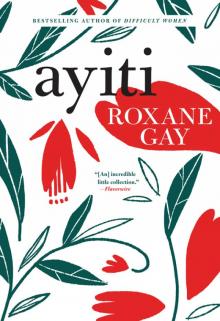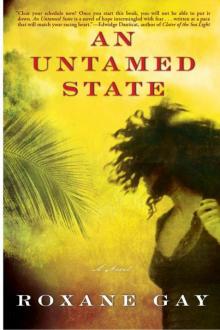- Home
- Roxane Gay
The Best American Short Stories 2018 Page 24
The Best American Short Stories 2018 Read online
Page 24
There, in the middle, on a stretcher bedecked in fake jewels and sugar skulls and roses and cakes, lies the mayor. Carried by the four strongest men in the town. Fishbelly white and sloppy red, dressed in a white baptismal gown with his hands laced together over his prodigious gut. Eyes closed and held sealed with two heavy silver coins. Washed and trimmed and shaved leather-smooth. Brought unto the edges of the known world to be made whole again, their very own Hillbilly Christ.
Leonel’s sure he died like he always does—too much crank and booze and pussy and doughnuts for his overworked heart to handle. Wonder who found him this time. Suppose it doesn’t really matter. Agaju will do what he always does, and behind their masks, they’ll all quietly thank their dead god that it worked. And everything will go back to running the way it always does. No cops. No law. No government eye. No consequences. A tiny kingdom with none but one rule.
Until the next time he dies. And the next. Again and again into the depths of vulgar infinity.
Leonel lowers Ochosi and lays it across his lap. Shuts his eyes and listens to the sound of the crowd’s hushed jabbering as it carries over his wreck of a home.
“—freaks—”
“—think it really works—”
“—must be some kind of sin—”
“—Threefer’s mad, always been that way—”
“—those boys getting to be a problem, I don’t give a fuck what they can—”
“—You haven’t seen him do what I have—”
“—public nuisance—”
“—freaks—”
He hears them all. They say his name. They mangle it with hate and fear and too many teeth. Maybe they’ve never heard it said right. Something wrong with their hearing, something wrong with their brains. Leonel thinks about him and Ochosi cleaning the wax out of their heads.
Electric candles light their way from behind, but he doesn’t see them. He just lies in his self-made cage and lets the blood bubble out of his brain.
The limbs are cracked and splintery and uneven and don’t fit over his mangled stumps the way they used to. Had them made years back, when he was thinner, less gruesome. He hasn’t worn them in almost two years, and in the time between they’ve started to grit and rot. They grind wooden needles into his scars and his bones and he cinches the leather belts tighter to distract from the hurt. The skin underneath goes pallid and squeezed-stiff and he punches his misbehaving flesh in toward the bone until it learns to do what it’s told. He secures the buckles and, swallowing back tears and yelps, heaves himself up.
Agaju totters over to the dresser on driftwood legs and uncaps a pint of Yukon Jack, presses the mouth to his lips and drains it. Honey and spice and battery acid snarl into flame in his belly like a torch held to a ball of crude oil. It aggravates his ulcers and for a moment, he feels as if he’s going to belch blood, but it passes and settles into a manageable, coiled pain.
Then there’s a knock at the front door and it’s time.
He creaks and clicks into the living room and shows them all to the altar. The four biggest ones set the mayor down on the marble slab and step back. All the masks turn slowly to leer at him with plastic imitations. Nobody makes a sound. They know how this works. After seeing it so many times, they’d better. He basks in the silence. Owns it.
For a moment—just a moment—he thinks of his boys. Skeet, out in the hallway in his ritual raiments, the X’s under his eyes pulsing with power. He doesn’t know where the other one is. Wherever fucko got to, he’d best stay there, not fuck this up.
Agaju takes a deep breath, and begins. The sound is like a clap of thunder.
Skeet slips into the altar room as his dad shows the townies to their places. He’s small, so it’s not hard to hide behind adult legs and skirts, staying out of sight. They’re all wearing masks anyway, so of course they can’t see. Agaju’s too concerned with staying upright to see anything else, but Skeet sees him. All that pride cut across his face like carved from wood. Severe and ugly darks and lights burned into his flesh.
Power gathers around the altar, makes the air feel puffy electric. Skeet’s lower eyelids hurt and the crowd goes silent. Blood pools heavy in his fingertips as if drawn there by some alien gravity. It’s close, now. He wonders if Agaju can really feel it or if he’s just faking it.
In the middle of the room, a crease opens in the altar and none of them see it. Not even the old man has eyes to understand. Beyond the crease, Skeet can see shapes, impossibly massive and drowned in shadow, writhing in the light. His mind recoils at first, but he makes himself look into this strange bright dark beyond, to call to them, these dark things. Teeth the size of houses, tongues like highways. He leers into the strange void and when a colossal yellow and black eye rolls toward him, he has to force himself to not scream. It’s coming. The ritual is already underway—just not the one Agaju thought.
The crease splits wider and light begins to spill out, laying heavy on the crowd, a blinding, tangible thing. It renders the expensive horrors pulled over their faces cheap and artificial, exposed for mummery. Skeet wonders if, underneath their costumes, they’re squinting without knowing why. He hopes so, likes to think so.
He leans into the power and the light and the presence of that terrible, lake-sized eye, makes himself a conduit.
He whispers his true name against the crushing silence and that’s when the quiet’s blown apart.
Something fucked up happens to a normal person’s brain the first time they see real magic. It’s like a disconnect. Because real magic isn’t like people imagine in the movies.
Real magic is so much better, and so much worse.
Most people can’t comprehend it, really. It’s too much, too sudden, too vulgar. So the brain only lets in little pieces, flashes of light and color and salvos of sound from far off and not much more. It edits the rest out, cuts lacunae in itself, leaving little more than pitty cigarette burns behind. Metaphysical self-mutilation at its finest, the limited human mind hurting itself in little ways in order to distract from the bigger, uglier damage. To make the truth a little more manageable, because undiluted, it isn’t.
The truth is that magic’s a beast, enormous and lumbering and starving. It’s powerful, and it’s violent, and it makes a fuck-awful mess that people don’t want to see, or if they see, they don’t want to remember. So their minds compartmentalize and let them remember the lights and the pretty colors and the temporary suspension of the laws of physics. They hear thunder instead of screaming. They forget the blood and the shock and the stink and the explosions of teeth and hair that seem to come out of nowhere.
They forget that magic’s like watching someone get shot in the head.
Even when they’re watching someone get shot in the head.
The finger-thick bullet rips through brain and bone and Agaju’s face bursts in a bright red poppy.
He hits the floor in slow motion and everyone starts screaming.
In the corner, his marked eyes glowing in the shadows, Skeet forces the crease the rest of the way open and lets the magic do the rest.
Say fucko now, you stumpy shit.
Ochosi barks again and mule-kicks the soft of Leonel’s shoulder. A cloud of smoke rises from the muzzle, and through the blown-out window, he sees a sheet of blood skate off a lady’s head before atomizing into thin nothing. Behind the smell of burned powder, there’s the ozone electricity of his brother’s ritual seeping out of the house in vaporous waves. Almost at its saturation point. Seconds away.
Skeet’ll handle his part, Leonel just has to handle his own. Crowd control, that’s what his little brother called it in the letter. He had the whole thing planned out. Freedom from the gimp and his abuses and his bullshit in a few easy steps. All it would take was a whole lot of dead people, and that wasn’t going to be a problem.
Leonel knocks another empty brass from the rifle and looks down the scope at another scared masked someone, crouching and hiding from the madness they’ve found themselves
in.
Breathes, in, then out, slow.
Pop.
Another spray of hand-tooled foam rubber and chunks like rose petals floats into the dark.
The air inside catches fire and resolves itself into a spiderweb of characters from a language that doesn’t exist. They swirl and lick and flood into each other, a wave of orange and red and black descending on the gathered heads as they’re trying to escape. It’s no good. The doors are lodged shut, or locked, or blocked. The result’s the same. The manimals start clawing at each other, kicking and punching to try and find another escape that doesn’t exist. The smell of burning pork mingles with the rank fog filling up the room.
Then, finally, thankfully, they start to die.
They breathe and swallow scalding oxygen, they catch flame and fall to the ground next to what’s left of the old man. They roll around. They scream. They beg. In the middle of the room, the mayor’s anointed carcass swells and blackens and erupts, spilling over with a phalanx of rotten meat and insects and unidentifiable effluvium that immediately catches fire. The burning spillage runs over everything, seeps into eyes and noses and throats. Living napalm burns the life from them.
Then they go quiet, all at once. The magic drains all out of the room, and then Skeet’s alone in an abattoir. He’s exhausted and sweaty and sort, but he’s smiling wider than he has in maybe his whole life. It splits his face in half, a white calcium zipper spotted with red and black. Something moves under his skin, something gargantuan and heinous and ancient. His tattoos knit themselves into another shape, and beneath his feet, the house is collapsing. He unlocks the doors and leaves to wait for his brother.
Wood bows and cracks, siding warps and gets stripped away. Glass bubbles out for the briefest of moments before shattering entire. The house crumples in on itself as if pressed by a compactor, or crushed by the invisible hands of some pissed-off elder god. Leonel watches it happen from atop his tower of ruin, Ochosi still warm in his white-knuckled fists. It doesn’t make any sense.
When the house is good and flattened and gone and the smoke’s cleared, he looks down the scope again, just in time to see Skeet’s small form walking off, away from the crash and massacre.
Down to the rivermark.
“Are they all dead?”
“Yes.”
“All of them?”
“Yes. All of them.”
“What happened to the house?”
“Gone.”
“I saw.”
“Then why’d you ask?”
Skeet’s floating in the river, arms out like a drowned Christ. Black water that wasn’t here before laps at him and drags the edges of his clothes out in white streamers. Leonel can see that his little brother’s tattoos aren’t X’s anymore, they’re stars, infinitely black. He has the sudden vertiginous sensation that he’s not just talking to his brother. The twin stars look up at the empty night, seeing more than Skeet’s other eyes ever could. Ochosi is heavy in Leonel’s hands, but he holds it close all the same.
“Did you do that to the house?”
“Maybe.”
“How?”
“I can do anything.”
As if to illustrate his point, Skeet raises one hand from the water and all around him, slithering red and white coils surface and dive and surface again. Leonel sees long blades of fin, and pocks of bright black eyes. Eels. Dozens of streaky, albino eels. He shudders, suppresses his gag reflex, but doesn’t look away. There’s a pattern to it, some horrible symmetry in their thralled ballet. He doesn’t want to see how it’s beautiful, but he can’t help it. The eels froth around Skeet for another moment, then vanish underneath the sputile waves.
“How did it feel?”
He almost lies, then he doesn’t.
“Good.”
“Good.”
Thunder trundles overhead, uneven percussion beyond the clouds. Leonel’s shoes sink into the wet loam of the rivermark. Grubby dirtwater splashes his laces. It takes him a minute to realize, the river is rising. Slow at first, but now steadily. He steps back onto the dead grass to stay dry. It crisps under his feet, a whisper against the chatter of the water. He turns away and doesn’t see the thing that became his brother sinking in.
Over the ridge, the lights are flickering and going out. The wakes rumbling to rest, the townies passing out drunk and stoned for the night or maybe just dying. Maybe the fog of his brother’s magic reached that far, snuffing lives out as it rolled along the wastes, chilly and indifferent. By morning, whoever was left would come looking for their friends and mothers and brothers, and when they came, they would come with teeth and knives and bullets and heads brimming with weird, spoiled hate. They’d cut the boys apart and eat the pieces. Screaming and jacking off to their own delusional self-righteousness as they did. They would have their revenge.
Or at least they’d try.
Better that they never get the chance. Leonel turns back to tell the brother-thing that he understands, but it’s gone. Only the waves remain as the black, oily river rises nearer the ridge that blocks it from the rest of the valley. Not long before it spills over, blackens and drowns everything in its path. Heedless.
Leonel watches the opaque water rushing over everything for a moment more, then returns to the remains of the compound and fetches his boxes of bullets before turning his attention back to the distant town. He sets off on foot. He takes his time, no need to rush. The walk is cold and dusty and he pays it no mind. They get closer and closer and Ochosi grows warmer against his palms, as if excited. He purrs to the gun as he reloads it and walks the path. He tells it secrets and the gun whispers back.
At the edge of the town, next to the first house, they stop and listen to the nothing of locked doors and drunk sleep. The stillness of playhouses and rust-blackened barbecues and empty, distant highways. Not long for this world.
There are lights left to extinguish and he still has a little magic of his own left to dispense.
Dina Nayeri
A Big True
from The Southern Review
Standing outside her locked door, he scanned his memory for places Yasmine might have gone—a drink? A day-trip? He walked the forty blocks back to Port Authority, spending most of it knotted in regrets and daydreams. He adjusted his earbuds, turning up the sound on the 1970s Turkish folk player he had found, his late father’s colleague. The ragged old hippie droned in Rahad’s ear as he walked, the sound crossing oceans and decades. Every time he heard this song, he remembered the singer’s thick moustache, the way he seemed to sing through it. He missed Yas. Against all reason and recent memory, he had imagined her delighted to spend an afternoon together, indulging in a bottle of smoky red. If he had taught her nothing else, at least she had kept this: an hour isn’t squandered if you taste a good wine, if you fill your ears with good music. He had convinced himself that such a visit would be possible, if he could just survive her initial surprise and anger—he hadn’t considered that she may be spending the day elsewhere.
The last time he showed up unannounced, his welcome was a long, dramatic sigh. “I called, azizam,” he said, deflecting the lecture he knew was brewing in her head. He didn’t set down his overnight bag or sitar case for fear of her anger, but in the end, she invited him in. “I called many times,” he said and moved past her. “You don’t check your messages. I got tired of waiting.” That was months ago.
Today he had rung her doorbell again and again, shifted his bag and case to his left shoulder, and glanced up at her girlish, sea-green curtains, before turning north to catch a bus to Wilmington. His cheeks flushed—he had believed she would invite him to stay for a night or two. He had believed with such force. Never mind, he thought; that afternoon he would move into the Wilmington YMCA, his fourteenth in six years, but better not to make a spectacle of it. Since the death of her mother when she was six, Yasmine suffered from a kind of hysteria triggered only by his various superficial prospects.
He shook his phone for a new song, los
ing himself in one by Thom Yorke—oh, how he loved Western music. How glorious, whatever the style. Secretly, he liked it far more than the Iranian sitar classics he had played to spellbound crowds in Tehran. Maybe later he would post this song and collect the likes, lucky amulets to carry on the road. This meager attention helped him fend off the suffering over Yasmine and Iran, his vanished self, his music. His father, the elder ustad Sokouti, had been a world-renowned master of seven string instruments, and Rahad a celebrated sitarist and music teacher—but no ustad, no master. Still, he had a voice. But by the time the blood reached his daughter, it seemed all artistry had been strained out. Who, then, would remember those heady Tehran nights?
On the bus, he posted and waited. The song was bad bait—only four likes. He felt ashamed for the display: a serious Iranian musician, in his fifties no less, posting the songs of American teenagers who have no musical education. No, no, Yorke was good, and not even an American.
Now Yasmine appeared at the top of his feed. Ah. She was spending the weekend in Connecticut. He was tempted to like it, but refrained. She blocked so willy-nilly lately, and since he reopened his account, she had liked nothing of his. Where was the dignity of fatherhood? Yesterday, fifteen people had liked his post; but from her, nothing.
In Wilmington, the April air was crackling and fresh—none of the wet, cold residue of winter that covered New York—and the walk from the bus station revived him. Before long he saw it, the brown brick, the blue sign: YOUNG MEN’S CHRISTIAN ASSOCIATION. He was neither a young man nor a Christian, though he was willing to pretend—in fact, he enjoyed it; there was great peace in disappearing. In Iran he had pretended to be a Muslim while spending every night in underground clubs. Once, in an Afghan village he had pretended to be his own father—all this in service of hunting the next great fog of music in which to disappear, a rhythm to shape that month or that year.

 Graceful Burdens (Out of Line collection)
Graceful Burdens (Out of Line collection) The Best American Short Stories 2018
The Best American Short Stories 2018 Bad Feminist
Bad Feminist Bad Feminist: Essays
Bad Feminist: Essays Ayiti
Ayiti Difficult Women
Difficult Women An Untamed State
An Untamed State Hunger
Hunger